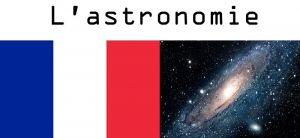Language/French/Vocabulary/Astronomy
Bonjour à tous ! 😊
In this lesson, you will learn French terms related to astronomy to talk about planets and stars.
The names of the planets are similar in French and English because they come from Latin and Greek but be careful because their pronunciations can be quite different.
In this lesson:
- You will start by studying the vocabulary related to astronomy.
- You will watch videos and listen to the pronunciation of words by a native French speaker.
- Finally you will put your knowledge into application with some exercises.
Useful French Words Related to Astronomy
Study the words below:
| English | French | Audio |
|---|---|---|
| an asteroid | un astéroïde | |
| an astronaut | un/une astronaute | |
| an astronomer | un/une astronome | |
| a comet | la comète | |
| a constellation | une constellation | |
| the Earth | la Terre * | |
| a rocket | une fusée | |
| a galaxy | la galaxie | |
| Jupiter | Jupiter * | |
| Mars | Mars * | |
| Mercury | Mercure * | |
| a meteor | le météore | |
| a meteorite | un/une météorite | |
| the moon | la Lune | |
| a nebula | une nébuleuse | |
| Neptune | Neptune * | |
| a planet | une Planète | |
| Pluto | Pluton * | |
| Saturn | Saturne * | |
| the sky | le ciel | |
| the solar system | le système solaire | |
| the space | L'espace | |
| a spaceship | un vaisseau spatial | |
| a star | une étoile | |
| the sun | le Soleil* | |
| a telescope | le télescope | |
| the universe | L'Univers | |
| Uranus | Uranus* | |
| the milky way | la Voie lactée (aussi nommée la Galaxie) | |
| Venus | Vénus* |
* When writing a planet name, we use capital letters.
Videos
Watch the following videos:
PLANETS IN FRENCH
The Solar System
FRENCH VOCABULARY: Outer Space
Exercise
Translate this text in English
French
"L'astronomie nous amène à vouloir étudier l'univers, les galaxies, les étoiles, les planètes et tout ce qui se passe au-delà de l'espace terrestre. L'observation de l'univers et de notre voie lactée pousse notre curiosité à en savoir encore plus. Après avoir contemplé les myriades d'étoiles dans un ciel d'été limpide ou la beauté de la pleine lune qui illumine la nuit, nos enfants viennent nous poser des questions auxquelles nous n'avons pas toujours de réponses. Ils veulent ainsi voyager dans l'espace à travers les étoiles et les planètes grâce à des vaisseaux spatiaux ou des fusées. Ils rêvent même de devenir astronautes dans le futur. Comment pouvez-vous leur expliquer ce phénomène magique et attractif ?"
Solution: English
"Astronomy leads us to want to study the universe, galaxies, stars, planets and everything that happens beyond terrestrial space. Observing the universe and our milky way pushes our curiosity to know even more. After having contemplated the myriads of stars in a limpid summer sky or the beauty of the full moon which illuminates the night, our children come to ask us questions to which we do not always have answers. They thus want to travel in space through the stars and the planets thanks to spaceships or rockets. They even dream of becoming astronauts in the future. How can you explain this magical and attractive phenomenon to them?"
Answer those questions in French
- Quelle est la planète la plus éloignée de notre galaxie ?
- Combien de planètes y a-t-il dans notre galaxie ?
- Quelle est la distance de la Terre au Soleil ?
- Quelle est la vitesse de la lumière ?
- Qui a été le premier homme à marcher sur la Lune ?
- Avez-vous déjà regardé les étoiles grace à un télescope ?
- Pouvez-vous me citer cinq planètes de notre système solaire ?

